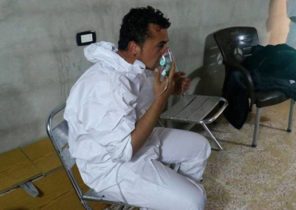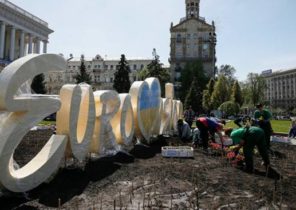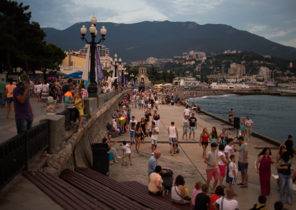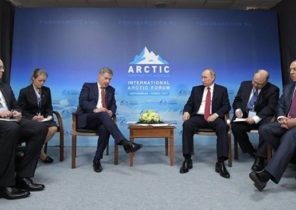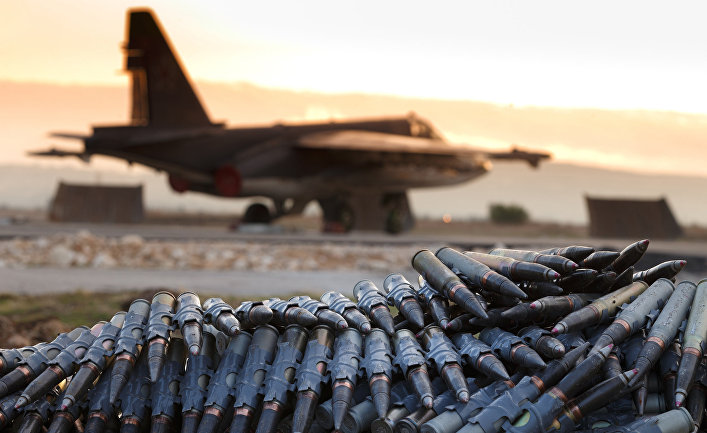
One of the consequences of Moscow’s interference in Syria is the opening of the Russian Navy permanent access to the Mediterranean sea. The success of this policy that has failed and kings, and the Soviet Union, requires the provision of points of support.
With the support of Syria, in a situation where Egypt is increasingly seeks closer ties with Russia, Vladimir Putin is now looking towards Libya and deepwater port in Tobruk in Cyrenaica. Therefore, he supported the General Haftarot.
However, the Russian President is more visionary. Supporting Morocco in the Western Sahara, he is already preparing for the exit to the Atlantic ocean. In response to this promotion Brussels “neuter” and “types” quay d’orsay will have nothing to say. As to Algeria, then he was paralyzed and thrown out of the game because of the support of Polisario.
From the Crimea to Morocco this Russian policy, which shuffles the cards of the Mediterranean geopolitics, was carried out in seven steps in less than three years.
Explanation and development
Stage 1: the annexation of Crimea to Russia
In February 2014, Russia returned Crimea, Vladimir Putin has set the foundations for a new Mediterranean policy of the country. Because of their historical illiteracy and ideological and analytical errors, the Europeans did not understand the magnitude and importance of this event. The return of the Crimea to Russia, the transformation of Sevastopol into an impregnable fortress was actually just preparation for the Mediterranean plan.
Step 2: save Syria
Providing bases in the Crimea, Russia starts phase two of his plan, that is, the strengthening of military bases in Tartus and Latakia, which is given for the salvation of the regime of Damascus.
This goal was achieved in October 2015.
Stage 3: real policy with Turkey
Error of the Turkish pilots who shot down 27 Nov 2015, the Russian aircraft has allowed Vladimir Putin is so intimidated by President Erdogan that he understood that it was better to reach an understanding with its powerful neighbor than to provoke it. Their American allies supported the Kurdish separatists and hid their mortal enemy, the opposition to gülen.
The result of these changes in alliances was the resumption of cooperation between Moscow and Ankara, guaranteeing the free navigation of Russian warships in the Straits. This finally weakens the position of NATO.
Stage 4: Egypt turns away from alliances
The necessary expansion of the perimeter of the Russian defense affects Egypt through an amazing convergence of General al-Sisi and President Assad, which started actually in October 2016.
This is another major success of Russian diplomacy and the coup in geopolitics, the result of which European observers are unable to assess adequately. Egypt, economically dependent on Saudi Arabia, sworn enemy of Syria, in Alliance with Moscow and Tehran, had dared to oppose his patron, on two key issues.
Despite the fact that Saudi Arabia is in a state of total war with President Assad in the UN security Council, Egypt has supported Russia on the Syrian issue, after which was followed by a bitter remark of the Ambassador of Saudi Arabia to the UN: “it is Sad that the position of Senegal, and Malaysia is closer to Arab countries than the position of the representative of the Arab world in the Security Council”.
Egypt took an independent position after refusing to send their troops to resist the Pro-Iranian Houthis in Yemen with troops in Saudi Arabia.
Can these changes in the Egyptian diplomacy to disturb the normalization of relations between Egypt and Iran? We will be able to judge this in the coming months. Anyway, since Moscow at the same time trying to bring closer the positions of Ankara and Tehran, the balance in the region may again soon change.
Insulted Saudi Arabia reacted to the step of Egypt by the termination of deliveries of oil within the framework of free transactions or at reduced rates, as well as supporting project of Ethiopia for the construction of “Renaissance Dam”. Egypt regards it as a provocation, as this construction will entail a lowering of the water level in the Nile. Cairo said that the decision of Saudi Arabia is “a dangerous political move that could hurt the interests of the 92 million Egyptians”.
Finally, a very obvious sign of the return of Moscow to Egypt in October 2016 became the part of Russian troops in military maneuvers with the Egyptian army in the Western desert that separates Egypt from Cyrenaica. That is near the region controlled by General Haftarot…
Stage 5: support of General Haftarot in Libya
Faced with chaos in Libya, stubbornly unwilling to accept the reality and comforting themselves with the democratic paradigm, the UN and the EU have created the appearance of recovery of Libya around phantom government “of national unity” supported by Islamist groups and Salafists of Tripolitania.
In the background of this primitive policy, Russia has developed a realistic plan, based on reliable data from military and rebel forces.
The development of this plan ended with the visit of General Haftarot in Moscow on 27 and 28 November 2016, when President Putin officially recognized that Russia gives its support to the person with whom EU diplomats refuse to talk directly, denying with rare ideological tenacity objectively existing reality…
General Haftar is well acquainted with Cyrenaica and Tobruk, the only deepwater port between Alexandria and mers-El-Kebira. He has the only army in the country. It controls 85% of oil reserves of Libya, 70% of gas reserves, five of the six oil storage tanks and four of the five refineries. The entire oil cake, from which 60% of Libyan oil is exported, is at his disposal.
In addition, he has the support of the tribal community of Cyrenaica and the tribes that supported Gaddafi in Tripolitania.
With the support from Russia before the Haftarah opens with three options.
1) He can try to conquer all of Libya and to destroy numerous gangster-Islamic education, destroying the country. Such a policy may be carried out only under condition of preservation Tawergha neutrality. Since this city-state will coordinate its steps with Turkey, we will be able to see, not fail really-political agreements between Moscow and Ankara, in Libya.
2) He can create an impenetrable space in Cyrenaica alone, that would pre-empt the actual division of Tripolitania and Cyrenaica. This opportunity will open to capture Tripolitania Islamists every chance that you can imagine.
3) He can create a national government in which it will become an authoritarian leader. This feature will be available only when the General will destroy all the armed groups, which brings us again to the possibility of No. 1.
Step 6: Algeria or Morocco?
Since all Maritime policy requires a fulcrum, Russian strategists developed an Algerian version with the base at mers-El-Kebir. Moreover, Moscow — the long-established with Algeria military relations, and Arsenal Algerian army largely consists of Russian weapons.
However, this option was discarded for two reasons. The first is that in 2013, Algeria has categorically refused to allow the Russian Navy’s movement and operations. The second is the result of analytical work of geostrategy. The Mediterranean sea, as Black is closed. To get from the Black sea to the Mediterranean, inevitably must pass through the Turkish Straits. In addition, to get from the Mediterranean sea to get into the Atlantic ocean, or to enter, you must provide free access through the sea corridor between Gibraltar and cap Spartel.
Thus, Morocco is an ideal partner, as he oversees the southern coast of Gibraltar. Besides, along with Western Sahara, the country has a huge Atlantic coast stretching from Tangier in the North to the border with Mauritania in the South.
Step 7: support for Morocco
For Morocco, the Western Sahara is not negotiable. March 15, 2016, during the official visit of king Mohammed VI to Russia, the Kremlin has confirmed that it “takes into account the position of Morocco in the Western Sahara”.
With this statement, Russia drew a line under more than half a century of relations with Algeria, the patron of the Polisario, the movement for the independence of Sahara. She also opposed the UN Secretary-General ban Ki-moon, who dared to call the Moroccan presence in the provinces of the Sahara “occupation”.
This statement significantly strengthens the position of the Discount, weakening the position of the Polisario and Algeria, Moroccan and opens opportunities for the Russian Navy…
